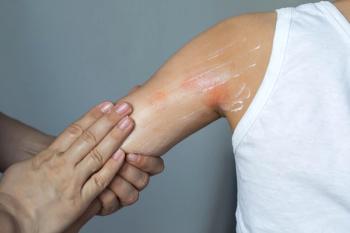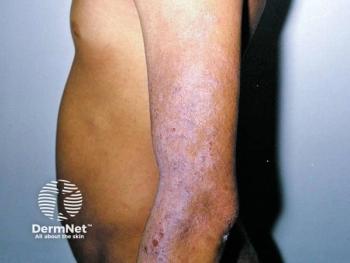
Accutane may counter, not cause, depressive symptoms
St. Louis — A recent study shows that isotretinoin has the potential to improve depressed mood among adolescent users much more often than to cause it, as the package insert warns.
According to a study conducted by a team of doctors at St. Louis University Health Sciences Center and later published in the May issue of Archives of Dermatology, the use of isotretinoin, particularly Accutane (Hoffman La-Roche), in the treatment of moderate to severe acne in adolescents was not associated with an increase in depressive symptoms.
"On the contrary," write the study's authors, "our study shows that treatment of acne improves depressive symptoms."
Accutane is a synthetic molecule derived from vitamin A, which is involved in growth and maintenance of skin. The drug prevents pimples by correcting abnormal follicular keratinization and shrinking the enlarged sebaceous glands that contribute to the primary pathogenesis of acne. Accutane has proved to be a highly effective drug in the treatment of severe acne, but data has emerged in recent years that suggest the drug may cause severe depression and even suicide in some patients.
In 1986, the Food and Drug Administration (FDA) mandated a change in the package insert to include the risk of depression. In 2000, the FDA mandated that this risk be placed on the package label with the words "Accutane may cause depression, psychosis and, rarely, suicidal ideation, suicide attempts, suicide and aggressive behavior."
Not convinced
Elaine Siegfried, M.D., associate clinical professor of pediatrics and dermatology, St. Louis University, and private practitioner at Kids Dermatology in St. Louis, is the study's corresponding author. Prior to initiating the study, Dr. Siegfried says she wasn't convinced that Accutane caused symptoms of depression, let alone suicidal ideation.
"I think it's important to note that suicide, sadly, is the No. 2 (and) 3 cause of death among teenagers in this country," she says. "I've treated hundreds of teenage patients with Accutane, and have had no patients with suicidal ideation or attempts and, thankfully, none who have committed suicide. Accutane is a drug that gets negative press because it can cause birth defects, so it already had a strike against it in terms of public perception. When statistics and case reports were released linking the drug to depression and even suicide in some teenage patients, we wondered whether there wasn't an overreaction - whether the depression issue could be colored by the angst over side effects that can lead to birth defects.
"To quote a fellow dermatologist, Dr. Richard Fried, 'Scientific data pales in comparison to well-orchestrated media sensationalism.'"
New research study
Dr. Siegfried and her colleagues at St. Louis University decided to conduct their own study among their moderate-to-severe acne patients. The study began in 1997 and was completed in 2002.
"Our study was not funded or supported in any way by any pharmaceutical company," Dr. Siegfried says. "In fact, we got no funding from any source. The lack of a budget was the reason for the study's shortcomings: the relatively small size and lack of randomization. It was a study designed to include patients we saw in our practice over a five-year period."
Study objective
The objective of the study was to determine whether patients with moderate to severe acne who were treated with Accutane showed an increase in depressive symptoms compared with a control group of similar patients treated with conservative therapy.
Newsletter
Like what you’re reading? Subscribe to Dermatology Times for weekly updates on therapies, innovations, and real-world practice tips.












